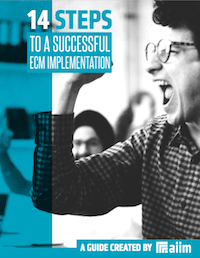The AIIM Blog
Keep your finger on the pulse of Intelligent Information Management with industry news, trends, and best practices.
AIIM on Air | Information Security
Remote working comes with a number of benefits both for the employee and the employer. Employees enjoy a better work-life balance, the comfort of their home office, and can avoid the stress of a commute. Businesses can save money, improve employee retention, and more. But, new challenges also arise with the recent boom in remote working, including cybersecurity threats like ransomware, data hacking, viruses, and more. At the office, typically somebody else takes care of the cybersecurity measures. But, when employees are working remotely on their home wifi systems, it's a bit of a different story. On this episode of the AIIM on Air Podcast, we take a look at what you can do to keep your systems safe and your company and private information protected.
Share
Information Governance | Intelligent Information Management (IIM)
In this series, we've been exploring the intersection of IIM policy and the law in order to help IIM practitioners and legal specialists work together more effectively by gaining a better understanding of the relationship between the two. So far, we've covered: Part 1 - IIM Policies and The Principle of Hearsay Part 2 - IIM Policies and "Ordinary Course of Business" Now, let's compare IIM policies to contracts.
Share

Making an ECM implementation successful requires planning and attention to detail. The best way to create the right solution is to identify organizational goals and priorities. Learn how to manage a successful implementation in our free guide.
Information Governance | Intelligent Information Management (IIM)
In this series, we've been exploring the intersection of IIM policy and the law. The idea here is to help IIM practitioners and legal specialists work together more effectively by gaining a better understanding of the relationship between the two. In my first post, where we explored the principle of hearsay, we left off asking about the relationship between IIM policies and the "ordinary course of business." So, let's take a look.
Share
Automation | Information Governance
Back in the day, when work was centralized in locations and on devices “within” the enterprise, it was reasonable to assume that control could most effectively be maintained by managing security at the firewall. Information security was largely a function of “keeping the bad guys out.”
Share
Information Governance | Intelligent Information Management (IIM)
Every so often, IIM practitioners and lawyers cross paths. One such intersection is around policy writing. As practitioners modify and improve their IIM policies, it's important to keep in mind how those policies specifically relate to the law. Understanding that relationship better will help IIM and legal specialists work together more effectively.
Share
Workplace automation is starting to become the norm for modern corporations. With automation enabling massive improvements in talent acquisition, employee recruitment, and customer service, it's no surprise that more and more enterprises are jumping on the automation bandwagon. Let's take a deeper look into how workplace automation leads to increased efficiency and profitability.
Share